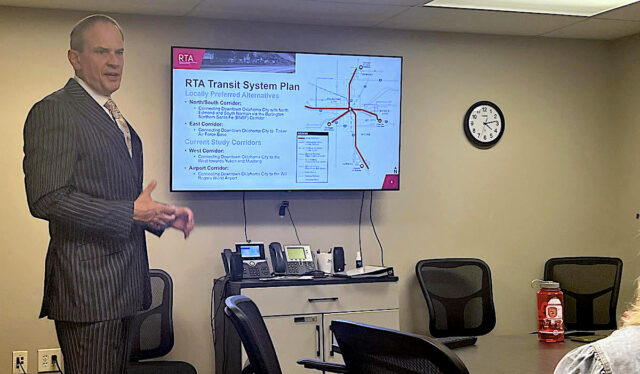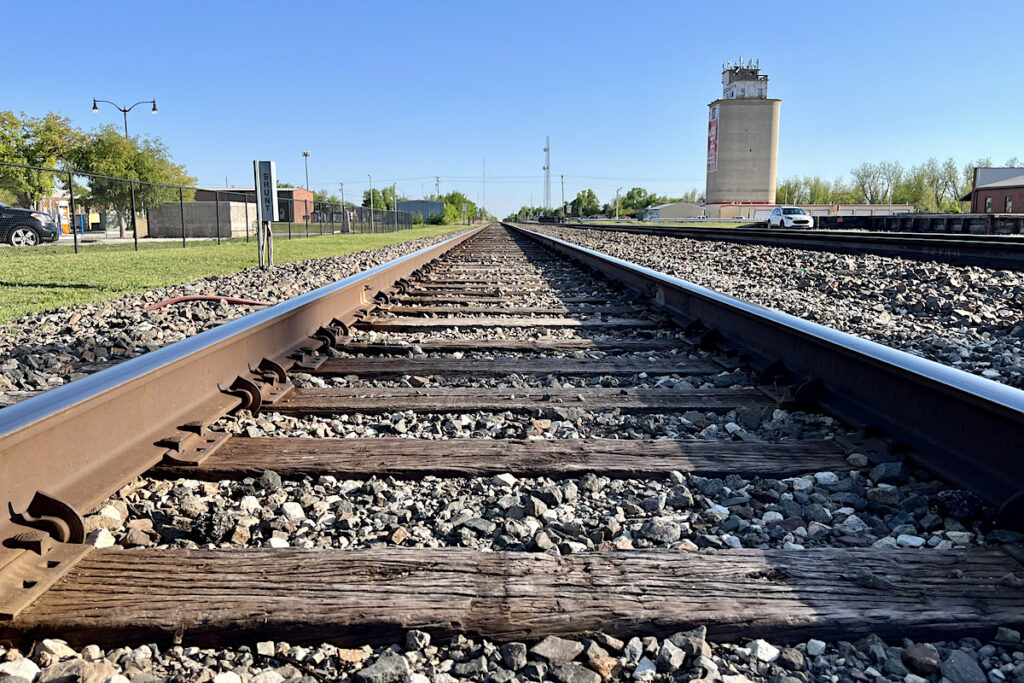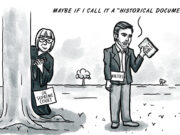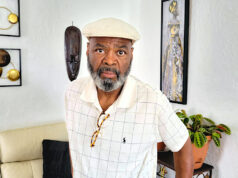
Cities and counties looking to hold sales tax elections between now and June 2025 were impeded by language within this year’s legislation that eliminated the state’s share of sales tax on groceries, but Gov. Kevin Stitt signed a trailer bill into law May 8 removing that section of law.
Section 2, Line A 3 of House Bill 1955, which was signed into law Feb. 27, prohibited sales tax increases approved at the ballot box by municipal and county voters from applying to “food and food ingredients” until June 30, 2025. But Senate Bill 1283, authored by Senate President Pro Tempore Greg Treat (R-OKC) and House Speaker Charles McCall (R-Atoka), has removed that language.
“The moratorium I could live with,” Treat told media May 2. “But it was never a justification for why I supported it. Then, we passed it, and several municipalities came to us and said, ‘Hey, does this apply to extensions of already existing sales tax streams.’ At first blush — I’m not a lawyer — so I said, ‘No,’ but then I said, ‘Let me check with my attorneys,’ and people smarter than me told me it does. (…) So I found it agreeable to eliminate the moratorium, and the speaker told me he wanted to do it.”
For the Regional Transportation Authority of Central Oklahoma and cities of Edmond, Oklahoma City and Norman, the trailer bill paves the way for those entities to bring potentially ballot questions to voters in the next year, such as a looming proposal for a commuter rail line running from Edmond to Norman.
Asked whether HB 1955’s initial limitation had complicated things for municipalities seeking to set dates for planned elections, Edmond city manager Scot Rigby said the exemption of food and food products from sales tax votes through mid-2025 worried cities and towns across the state because sales tax is one of the only revenue sources available to them.
“Local governments have to keep the lights on, the trash picked up, those type of things,” Rigby said. “We appreciate the state looking at that issue, but please don’t impact the ability for local control.”
RTA to ‘revisit’ spring 2025 for sales tax election

Jason Ferbrache, interim executive director of the Regional Transportation Authority of Central Oklahoma, said at an Edmond Mobility Commission meeting in March that the RTA was targeting a fall 2025 election for a ballot question asking Edmond, OKC and Norman voters to allocate a permanent portion of each city’s sales tax collections toward a commuter rail project.
Originally, RTA had targeted fall 2024 or spring 2025 for the simultaneous elections, but after the language within HB 1955 was passed into law, Ferbrache said March 21 that an election before June 30, 2025, was “off the table.”
“[The election] would not be prior to probably the fall of 2025, and part of that has to do with the recent grocery tax that was passed that kind of limits municipalities and such from doing anything until then,” Ferbrache said. “We were actually gearing up for maybe spring of 2025, but now it’s kind of off the table.”
With SB 1283’s approval, Ferbrache said last week that RTA will “revisit” spring 2025 for holding the elections.
“We were really gearing toward that spring of 2025 time frame until, of course, the legislation passed,” Ferbrache said. “I think this (trailer bill) gives us a real opportunity to revisit that spring date. The caveat here is, ultimately, that has to be decided by the cities to call the election, and there are a lot of intricacies to work out.”
The commuter rail project, which faces unanswered questions about its total cost to RTA member cities, will eventually require an access agreement with Burlington Northern Santa Fe to be completed. Ferbrache said RTA is negotiating that agreement with BNSF now.
“We’d like to at least have some terms agreed to for that access agreement and the improvements that will need to be made before we were to go to an election,” Ferbrache said. “We want to have as much certainty as we possibly can before we propose the project to the voters. Those are discussions and negotiations that we’re having now.”
If completed, the local passenger rail line would travel through each of RTA’s member cities along the north-south metro corridor. Additionally, the proposed project also includes additional transit corridors that could eventually take passengers to Tinker Air Force Base — the largest employer in the three cities — and Will Rogers World Airport.
Ferbrache said the east corridor from downtown OKC to Tinker Air Force Base would use bus rapid transit, a system recently enacted in Oklahoma City connecting downtown to Northwest Expressway via Classen Boulevard. While the transportation mode on the west corridor to Will Rogers World Airport remains undecided, RTA staff have a proposal, Ferbrache said.
“The recommendation that we’re going to be taking to the board on the airport alignment is actually light rail,” Ferbrache said.
Originally, Midwest City, Del City and Moore were members of the RTA. However, Midwest City withdrew from RTA in December 2021, while Del City and Moore withdrew in June 2022. City leaders cited financial impact as their reason for withdrawing.
State law limits RTA’s funding options for projects, in that the entity can only levy a sales tax within member cities at a maximum rate of 2 percent. No other tax revenue sources from member cities can be used to fund the commuter transit project, which would largely be backed by federal grants.
Ferbrache said specific rate decisions on a final proposal will be made by the RTA board.
“That’s always a policy decision, but I would think, and I think the board is thinking somewhere (around) 1 cent or less,” Ferbrache said.
Follow NonDoc’s Edmond coverage
Sales tax renewal, GO bond elections on horizon for Edmond

While Edmond, Oklahoma City and Norman could bring ballot questions to voters regarding the RTA rail project as early as spring 2025, Edmond may bring other ballot questions to voters before the end of 2024.
Cathy O’Connor, a consultant with COAlign Group hired by the city, recommended to the Edmond City Council on May 13 that the city bring both a 1-cent sales tax renewal question and a general obligation bond question to voters Nov. 5, the day of this year’s general election.
While Aug. 2 could also be an option for such those elections, O’Connor recommended the city place both questions on the Nov. 5 ballot.
“With the general election, you’re going to get a broader cross-section of voters that are coming to the ballot box,” O’Connor said. “Obviously (with) the presidential election, we’re going to have very high turnout, and because of that you tend to get a broader set of perspectives on different issues.”
Asked about the timing of both elections, Rigby said the Edmond City council will ultimately make those decisions. He said the newly formed citizens committee on GO bonds will make recommendations to the council on the size of the GO bond program and when to call the election.
Edmond lodging tax election
While not a sales tax, Edmond residents are set to decide June 18 whether to raise the city’s lodging tax from 4 to 6 percent.
O’Connor said through stakeholder interviews conducted by COAlign Group, there was a “consensus” to make Edmond’s existing 1-penny sales tax for operations permanent. As it currently stands, that tax is scheduled to sunset March 31, 2027. Additionally, a half-cent sales tax dedicated to capital improvement projects is also scheduled to sunset at that time.
“This idea of using a temporary sales tax to fund ongoing operations is really just not, frankly, very good financial management and creates a risk for the city that really you could do without,” O’Connor said.
Asked about the impact of potentially losing 1 percent of the city’s 3.75 percent sales tax rate if the renewal is voted down, Rigby said it’s too early to tell.
“We’d look to obviously trim as much as possible without significantly impacting any local services or employees. We’d look at many things to cover the gap as much as possible,” Rigby said. “The reality is — it’s not just what we talked about Monday, it’s been known for years — if 1 percent falls off, that’s a significant segment of your revenue sources, so things would have to adjust.”
O’Connor said Edmond stakeholders broadly expressed support for issuing GO bonds to fund road improvements and projects to help with traffic congestion across the city. But because the city has never used GO bonds to fund projects, O’Connor said the Edmond Public Schools District remains weary of that idea owing to the school district’s own use of property tax dollars for projects.
Unlike school bonds that need 60 percent voter approval to pass, general obligation bonds — which are backed by the full faith and credit of the governmental entity that takes out the loans — only need a simple majority of voters to be approved.
“I will say that there were concerns expressed by the school district that they saw the bond issue and the use of [property] taxes as kind of their domain and not the city’s,” O’Connor said. “But I do believe that there are ways to possibly talk with them some more and try to at least get them to be more supportive of this idea of traffic improvements.”
O’Connor said stakeholders want Edmond leaders to improve transparency and communication surrounding these upcoming ballot questions and funding issues. She also noted that 75 percent of projects proposed to be funded by general obligation bonds must be listed publicly prior to the election.
Rigby said the structure of the GO bond citizens committee will be formalized at the May 28 Edmond City Council meeting.
“We’ll talk about how many (appointees) each council member gets to select on that and that process,” Rigby said. “It’ll be open for a period of time for application.”





















